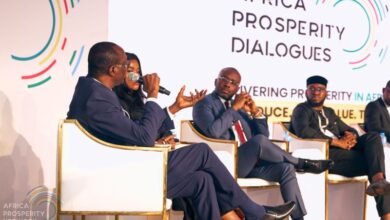Opinion: It’s past time to expand IMF’s African department
In late 2021, the International Monetary Fund marked the 60-year anniversary of its African department. That milestone was a worthy celebration of the extraordinarily dedicated service of IMF staff members over the years. But by taking a step back, it’s clear the department that leads IMF’s engagement in Africa could still do more. The divided composition of nations in the African department, and some of IMF’s policy interventions, arguably still reflect the traces of the continent’s colonial past.
By Thomas Laryea*
IMF was created in 1945 as part of the international financial architecture that emerged from the Second World War. Of the original IMF member countries, only three were from the African continent: Egypt, Ethiopia, and South Africa. While Liberia took part in the deliberations on the creation of IMF, it initially declined to join and only reversed its decision in 1962.
So why was the participation of Africa so limited at the time of IMF’s creation? Part of the answer is that IMF’s Articles of Agreement contains a provision — Article XXXI, Section 2(g) — that to this day says, “By their signature of this Agreement, all governments accept it both on their own behalf and in respect of all their colonies.”
Accordingly, the international world order that once reflected and buttressed colonialism excluded most African countries from IMF membership, but they were subject to the institution’s remit as colonies of its European members. In contrast, India was admitted as an original member of IMF at the end of 1945, even though the country officially gained independence from the U.K. in 1947.
We have come a long way since those overtly colonial times — but not far enough. Today, IMF’s 190 members include every African nation. Among the incentives for African countries to join IMF is that such membership is an international legal condition for membership with the World Bank.
These two Washington-based institutions can, in principle, act as a counterweight to the legacy of colonial dependency from which African countries have been working to extricate themselves over the past century. Conversely, IMF and the World Bank need to remain vigilant against being positioned as instruments perpetuating colonial legacies.
Some compositional issues within IMF have been fixed along the way. You might be surprised to learn that South Africa was designated as part of IMF’s European department until 1992. Of course, there were both technical and political arguments for the institution to treat the country as if it were part of Europe, even well after IMF had established an African department.
But viewing this with today’s eyes shows that the approach arguably reflected some of the forces in the international community that cushioned the apartheid regime in South Africa from economic and racial integration with other parts of the African continent.
Yet IMF’s African department continues to exclude countries from North Africa down to Sudan, which are instead classed as part of the Middle East and Central Asia department. The sub-Saharan demarcation of the African department is more than symbolic; it may distort IMF statistics, country or regional analyses, and policy prescriptions.
Granted, IMF has to make choices in its internal organization, but those choices themselves are informed by strategic considerations. After the collapse of the Soviet Union, Russia was accepted as a continuing member at the institution. And over time, the resulting new states from Central and Eastern Europe applied for IMF membership.
« The anachronism of IMF’s organizational structure … resonates with a divide-and-conquer mentality that has been an undeniable part of international relations with Africa »
IMF at first responded by creating a second European department to engage with these new member countries. But the institution’s managing director abolished this divide in 2003 and reinstated a single European department, recognizing the benefits of a more integrated approach — particularly since many of the new IMF member countries were candidates to join the European Union.
Since the creation of the — partial — African department, similarly important Pan-African institutions have grown, such as the African Development Bank and the African Union. The advent of the African Continental Free Trade Area in 2018 is another example of efforts to integrate the continent’s economies. And yet, unlike Europe, Africa remains divided within IMF.
It’s true that some institutional and operational reforms, other than the internal organization of staff resources, are important for IMF’s effective engagement with Africa. Over the past decade, some reforms have marginally enhanced the voice of African countries within IMF.
For instance, amendments to IMF’s Articles of Agreement increased the weight of basic votes allotted to each member, which slightly enhanced the voting rights of countries with small economies in Africa and elsewhere. And the appointment of additional alternate executive directors for constituencies with numerous countries has given African countries more resources for representation on IMF’s executive board.
Presently, the priority of channeling the institution’s recent $650 billion allocation of Special Drawing Rights to lower-income countries, including those in Africa, is also welcome.
While many of these institutional issues are matters for the wider IMF membership, the internal departmental structure falls squarely within the decision-making authority of the managing director. IMF’s current head, Kristalina Georgieva, has repeatedly emphasized that Africa is a high priority. She has an opportunity to translate that priority into IMF’s organizational structure to create a more cohesive view of Africa.
One of my concerns is that the anachronism of IMF’s organizational structure also resonates with a divide-and-conquer mentality that has been an undeniable part of international relations with Africa for far too long.
The economic policy responses to the COVID-19 pandemic illustrate this concern. The current policy debate appears animated both by other governments maneuvering for leverage over African countries and by indifference to the expressed longer-term interests of African nations.
For example, some quarters of the international community have not adequately accepted the lesson that Africa needs sustained access to private sources of financing for its development objectives. The so-called Summit on the Financing of African Economies, convened by the French government in May, is a depressing illustration. Invitations were limited just to the governmental sector, as if private finance had no part to play in Africa’s development.
Today, IMF can help safeguard Africa against the misuse of the COVID-19 pandemic to pull the continent back into outdated political-economic dependencies.
A recent Black History Month conversation between Georgieva and Ngozi Okonjo-Iweala, the director-general at the World Trade Organization, placed in critical perspective the past, present, and future of Africa, as well as its relations with international institutions. This proposed realignment of IMF’s organizational structure and strategic direction to mitigate the artificial divides forced on African nations is informed by that same perspective. In the years to come, we’ll likely look back and wonder why it took so long.
*Thomas Laryea is a recognized law and policy expert in international finance. He formerly worked at the International Monetary Fund. In private practice, he often represents sovereign debtors and creditors in matters related to finance and debt restructuring, including Argentina, Belize, Mozambique, Suriname, Sudan, and Gambia. He is “of counsel” at Orrick, Herrington & Sutcliffe.
Source: Devex’s editorial views.





